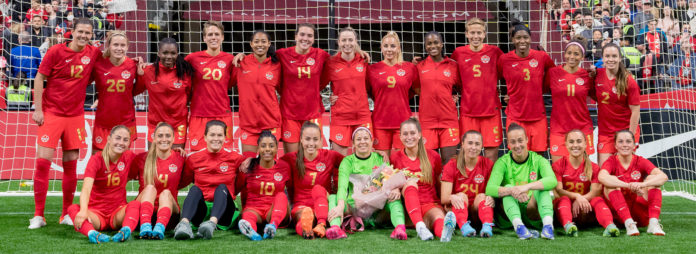The Canadian women’s national soccer team went on strike against Canada Soccer on Feb. 10 in protest of the budget cuts, unequal pay and lack of support their team has been shown just six months before the Women’s World Cup.
In a statement addressed to Canada Soccer, the team conveyed these issues are rooted in gender inequity. Canada Soccer shut down the strikes by threatening to sue the team, obligating them to continue playing.
So, in a whirl of the media spotlight, they did play — their kits inside out, Canada Soccer crests taped over, or in purple jerseys embroidered with the words “enough is enough.”
At St. Thomas University, student-athletes and faculty interpret the protests with optimism and discuss their understandings of gender inequity in sports.
Abby Cameron, fourth year student-athlete studying human rights, criminology and sociology, plays on the STU women’s soccer team as a left back and winger. She began playing soccer before she started elementary school, and said she can’t imagine life without it.
“From my perspective, the women’s team was doing a good thing and standing their ground,” said Cameron of the protests. “That’s the only way to bring about the change that’s needed.”
She describes being a “woman in sport” as having a lack of televised female role models to look up to, which can cause detachment from the sport. Growing up, she didn’t know many professional women athletes, and recalls that only male athletes were viewed as “the stars.”
“It’s hard to care for something that is never televised or never shown,” said Cameron. “I feel like it’s a big deal to see these women … and I feel like it’s huge for … younger girls to see they have the ability to go far in their sport.”
Cameron said playing soccer with STU has felt equitable, but she feels men are taken more seriously in broader contexts related to sports. She recently underwent knee surgeries after an injury and met with physiotherapists, some who brushed off her recovery as something they couldn’t really help with, and others who treated the situation with care and diligence.
Meanwhile, her male counterparts, who had more minor injuries, were met with urgency.
“Men in sport, I guess, have more priority than women in sport,” said Cameron.
She believes activism for gender equity at the college level would involve women standing up for themselves, and men supporting women’s sports by attending their games and talking about their accomplishments. She added the dialogue around the protests will trickle down to help advance gender equity at local levels.
Cameron would like the protests to be successful, but also believes the attention the protests are getting is a victory in itself. She said the more people talk about something, the more people will care and work toward change.
Michael Dawson is a history professor at STU and teaches a course on sport and world history. The course details the development of sport across time and showcases world history through the lens of sport.
Recently, he covered the topic of gender and sexuality in sports.
“I’m hopefully laying the groundwork for all of my students to be aware of the kinds of inequities that have been out there,” he said.
Dawson said sports were established to “serve the interests of men.” It intersected with a social “masculinity crisis” in the western world, intent on reinforcing gender ideals.
Sports, he said, were a tool for ingraining male ideals like strength, power and conquest.
He considers Canada Soccer’s shutdown of the strikes to have sent a “chilling message” and follows the historical trend of women being silenced for advocating for equal opportunity.
However, Dawson is hopeful.
“I’m optimistic there will be improvements,” said Dawson.
“But everything I’ve studied suggests that that improvement [is] going to be incremental, and the agitation, the campaigns, the efforts to move things ahead inevitably face push back.”
The former head of Canada Soccer, Nick Bontis, stepped down on Feb. 27 citing change, and was replaced by interim head, and former Olympian, Charmaine Crooks on March 1.
Crooks, the first woman and person of colour to be appointed the head of the organization, has been in Canada Soccer‘s management since 2013-14.
She’ll oversee the members of the Canadian women’s soccer team when they give their side of a story to a parliamentary heritage committee that begins on March 9, with Canada Soccer scheduled to speak on March 20.

